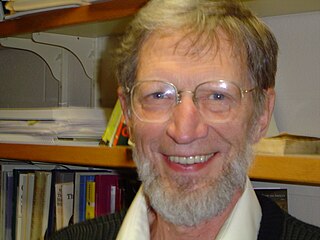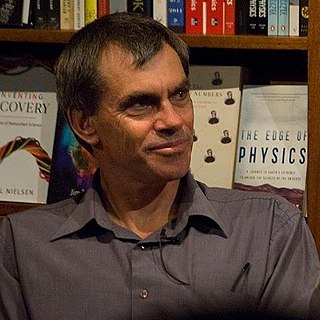Gödel's ontological proof is a formal argument by the mathematician Kurt Gödel (1906–1978) for the existence of God. The argument is in a line of development that goes back to Anselm of Canterbury (1033–1109). St. Anselm's ontological argument, in its most succinct form, is as follows: "God, by definition, is that for which no greater can be conceived. God exists in the understanding. If God exists in the understanding, we could imagine Him to be greater by existing in reality. Therefore, God must exist." A more elaborate version was given by Gottfried Leibniz (1646–1716); this is the version that Gödel studied and attempted to clarify with his ontological argument.
Neutral monism is an umbrella term for a class of metaphysical theories in the philosophy of mind, concerning the relation of mind to matter. These theories take the fundamental nature of reality to be neither mental nor physical; in other words it is "neutral".
The problem of evil is the question of how to reconcile the existence of evil and suffering with an omnipotent, omnibenevolent, and omniscient God. There are currently differing definitions of these concepts. The best known presentation of the problem is attributed to the Greek philosopher Epicurus. It was popularized by David Hume.

Alvin Carl Plantinga is an American analytic philosopher who works primarily in the fields of philosophy of religion, epistemology, and logic.

Richard Granville Swinburne is an English philosopher. He is an Emeritus Professor of Philosophy at the University of Oxford. Over the last 50 years, Swinburne has been a proponent of philosophical arguments for the existence of God. His philosophical contributions are primarily in the philosophy of religion and philosophy of science. He aroused much discussion with his early work in the philosophy of religion, a trilogy of books consisting of The Coherence of Theism, The Existence of God, and Faith and Reason.

William Lane Craig is an American analytic philosopher, Christian apologist, author, and Wesleyan theologian who upholds the view of Molinism and neo-Apollinarianism. He is a professor of philosophy at Houston Christian University and at the Talbot School of Theology of Biola University. Craig has updated and defended the Kalam cosmological argument for the existence of God. He has also published work where he argues in favor of the historical plausibility of the resurrection of Jesus. His study of divine aseity and Platonism culminated with his book God Over All.

In the philosophy of mind, panpsychism is the view that the mind or a mind-like aspect is a fundamental and ubiquitous feature of reality. It is also described as a theory that "the mind is a fundamental feature of the world which exists throughout the universe". It is one of the oldest philosophical theories, and has been ascribed to philosophers including Thales, Plato, Spinoza, Leibniz, William James, Alfred North Whitehead, Bertrand Russell, and Galen Strawson. In the 19th century, panpsychism was the default philosophy of mind in Western thought, but it saw a decline in the mid-20th century with the rise of logical positivism. Recent interest in the hard problem of consciousness and developments in the fields of neuroscience, psychology, and quantum physics have revived interest in panpsychism in the 21st century.
Galen John Strawson is a British analytic philosopher and literary critic who works primarily on philosophy of mind, metaphysics, John Locke, David Hume, Immanuel Kant and Friedrich Nietzsche. He has been a consultant editor at The Times Literary Supplement for many years, and a regular book reviewer for The Observer, The Sunday Times, The Independent, the Financial Times and The Guardian. He is the son of philosopher P. F. Strawson. He holds a chair in the Department of Philosophy at the University of Texas, Austin, and taught for many years before that at the University of Reading, City University of New York, and Oxford University.
The existence of God is a subject of debate in theology, the philosophy of religion, and popular culture. A wide variety of arguments for and against the existence of God can be categorized as logical, empirical, metaphysical, subjective or scientific. In philosophical terms, the question of the existence of God involves the disciplines of epistemology and ontology and the theory of value.

Frank Cameron JacksonFBA is an Australian analytic philosopher and Emeritus Professor in the School of Philosophy at Australian National University (ANU) where he had spent most of the latter part of his career. His primary research interests include epistemology, metaphysics, meta-ethics and the philosophy of mind. In the latter field he is best known for the "Mary's room" knowledge argument, a thought experiment that is one of the most discussed challenges to physicalism.
Metaphysical naturalism is a philosophical worldview which holds that there is nothing but natural elements, principles, and relations of the kind studied by the natural sciences. Methodological naturalism is a philosophical basis for science, for which metaphysical naturalism provides only one possible ontological foundation. Broadly, the corresponding theological perspective is religious naturalism or spiritual naturalism. More specifically, metaphysical naturalism rejects the supernatural concepts and explanations that are part of many religions.
William F. Vallicella is an American philosopher.

Graham Robert Oppy is an Australian philosopher whose main area of research is the philosophy of religion. He is Professor of Philosophy and Associate Dean of Research at Monash University, CEO of the Australasian Association of Philosophy, Chief Editor of the Australasian Philosophical Review, Associate Editor of the Australasian Journal of Philosophy, and is on the editorial boards of Philo, Philosopher's Compass, Religious Studies, and Sophia. He was elected Fellow of the Australian Academy of the Humanities in 2009. Graham Oppy is widely considered by some philosophers to be the most formidable defender of Atheism living today.
Atheism, in the broadest sense, is an absence of belief in the existence of deities. Less broadly, atheism is a rejection of the belief that any deities exist. In an even narrower sense, atheism is specifically the position that there are no deities. Atheism is contrasted with theism, which in its most general form is the belief that at least one deity exists.
Agnostic atheism or atheistic agnosticism is a philosophical position that encompasses both atheism and agnosticism. Agnostic atheists are atheistic because they do not hold a belief in the existence of any deity and are agnostic because they claim that the existence of a divine entity or entities is either unknowable in principle or currently unknown in fact.
An ontological argument is a philosophical argument, made from an ontological basis, that is advanced in support of the existence of God. Such arguments tend to refer to the state of being or existing. More specifically, ontological arguments are commonly conceived a priori in regard to the organization of the universe, whereby, if such organizational structure is true, God must exist.
Articles related to philosophy of religion include:
Australian philosophy refers to the philosophical tradition of the people of Australia and of its citizens abroad. Academic philosophy has been mostly pursued in universities. It has been broadly in the tradition of Anglo-American analytic philosophy, but has also had representatives of a diverse range of other schools, such as idealism, Catholic neo-scholasticism, Marxism, and continental, feminist and Asian philosophy.
Jordan Howard Sobel was a Canadian-American philosopher specializing in ethics, logic, and decision theory. He was a professor of philosophy at the University of Toronto, Canada. In addition to his areas of specialization, Sobel made notable contributions in the fields of philosophy of religion, and value theory. Before his death, Sobel was considered by Christian apologist William Lane Craig to be the leading philosophical defender of Atheism prior to Graham Oppy.
Nicholas Everitt is an English philosopher and atheist writer who specializes in epistemology and philosophy of religion.




